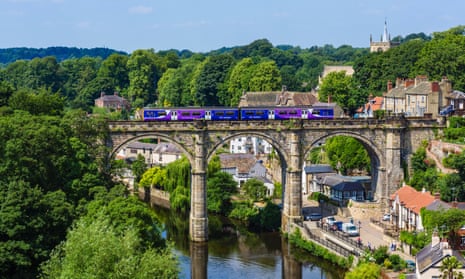A regulator’s report into the travel chaos that left thousands of passengers stranded earlier this year has criticised the rail industry, concluding that “nobody took charge” even when it became clear months before the biggest ever changes to UK timetables that the project was in serious trouble.
In an interim report into the timetable debacle, the Office of Road and Rail (ORR) singled out the train operators Govia Thameslink Railway (GTR) and Northern, Network Rail and the Department for Transport (DfT) for criticism, saying their mistakes had led to the “collapse” of services.
The ORR chairman, Stephen Glaister, said: “Good intentions and over-optimism within the rail industry about its ability to recover missed deadlines left no time to uncover and fix problems. In the event the operators were overwhelmed. They had made insufficient provision to help people in the event that things went wrong.”
The ORR’s interim report was published as the DfT launched a “root and branch” review of the UK rail network. The former British Airways chief executive Keith Williams will lead an examination of Britain’s rail network, which the transport minister, Chris Grayling, admitted was “no longer fit to meet today’s challenges”.
However, the DfT ruled out reversing privatisation, which it said had led to a doubling of passengers to 1.73 billion last year and record annual investment of £5.6bn.
The review follows a litany of rail crises, including the renationalisation of the East Coast line for the second time in 10 years, delays caused by strikes and engineering works, and a summer of misery for passengers as new timetables that took effect on 20 May caused mass cancellations across the north of England and on commuter lines into London.
Glaister said Network Rail’s timetable planning department did notice that a problem was developing with the May timetable changes.
“But they did not take sufficient action to manage the risks or the consequences,” he added. “The present industry arrangements do not support clarity of decision making: it was unclear who was responsible for what. Nobody took charge.”
He said there were several “critical points … where, had different decisions been taken, the subsequent disruption could have been avoided or significantly mitigated”.
The ORR blamed the train operators Govia Thameslink Railway and Northern for being badly prepared for the timetable changes and not doing enough to keep passengers informed of disruption.
The rail regulator also criticised the DfT and itself for failing to question the industry’s assurances about the risk of disruption.
The ORR concluded that the rail industry had “placed engineering and planning concerns ahead of serving its passengers, and that was made worse by the poor information train operators provided when disruption happened”.
Mick Whelan, general secretary of Aslef, the train drivers’ union, said: “They [train companies] do not employ enough drivers to run the services they promise in their franchise applications to deliver and they started driver training far too late. The DfT was, as usual, asleep at the wheel and Network Rail was behind on track enhancements.”
Shortly after the ORR published its report, the DfT confirmed plans for a full-scale review of Britain’s railways, with the aim of introducing reforms by 2020.
Grayling said: “Privatisation has delivered huge benefits of [sic] passengers on Britain’s railways – doubling passenger journeys and bringing in billions of private investment. But it is clear that the structure we inherited is no longer fit to meet today’s challenges and cope with increasing customer demand.”
The shadow transport secretary, Andy McDonald, said: “Rail passengers don’t need another review from the Tories to tell them that rail is broken. Another review is meaningless in a year of rocketing fares, failing franchises and timetabling chaos. Another review lets Chris Grayling off the hook. The railways need a Labour government which will deliver public ownership of rail.”
The Williams review will look at “bringing track and train closer together”, indicating a potential overhaul of the system – introduced with the privatisation of British Rail in 1994 – under which Network Rail manages the infrastructure used by private train operating companies.
The DfT said the review would look at how government “effectively balances public and private sector involvement”, adding that it would consider adjusting the existing franchise model, where private firms bid to run regional routes.
It will also consider ways to ensure that rail fares, set to rise by up to 3.2% next year, can achieve value for money, and seek to smooth industrial relations in the wake of a series of strikes on services operated by companies, including Southern, Northern and Merseyrail.
Paul Plummer, chief executive of the Rail Delivery Group, which represents the rail industry, called for the review to be as wide ranging as possible, examining “every part of the railway and focused on what works best for consumers and taxpayers”.
He said: “This review is a once-in-a-generation opportunity for the wide-ranging and independent thinking our railway needs and we stand ready to play our part to make sure it delivers big, bold, meaningful reform in the national interest.”
The rail industry has been rocked by a series of fiascos during 2018, including the decision in May to renationalise the East Coast line on a temporary basis after the operators Virgin and Stagecoach could no longer honour the promised payments to the government in the £3.3bn contract.
Later the same month the introduction of new timetables led to chaotic scenes as thousands of passengers were left stranded by cancellations.
The disruption, which affected passengers on the Northern and Thameslink routes particularly badly, was among the factors that led to punctuality on Britain’s rail networks slumping to a 12-year low in August.









